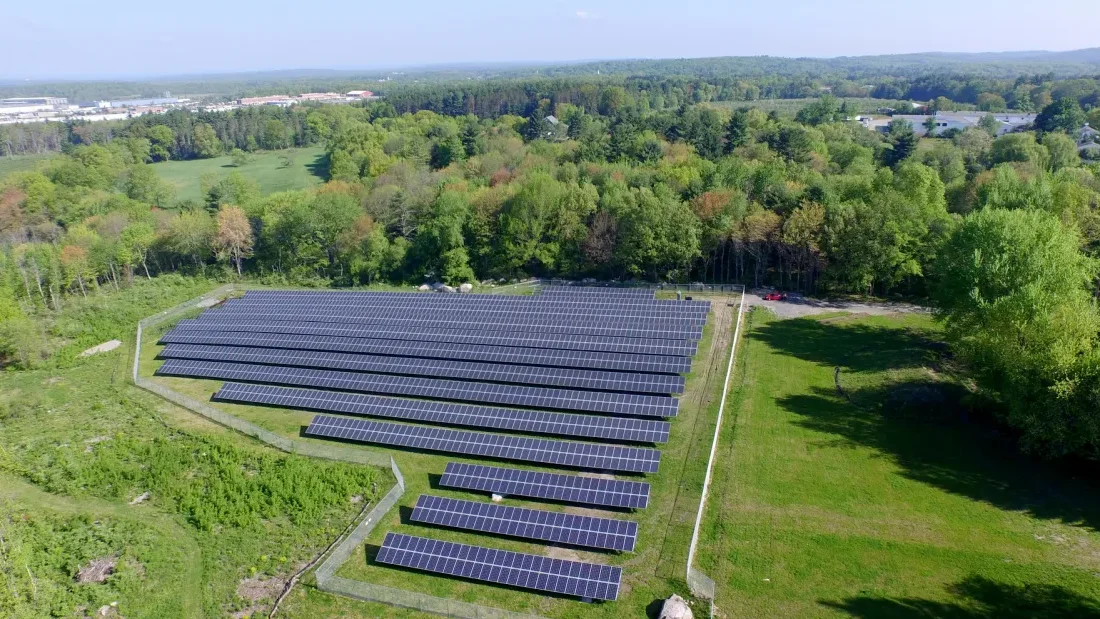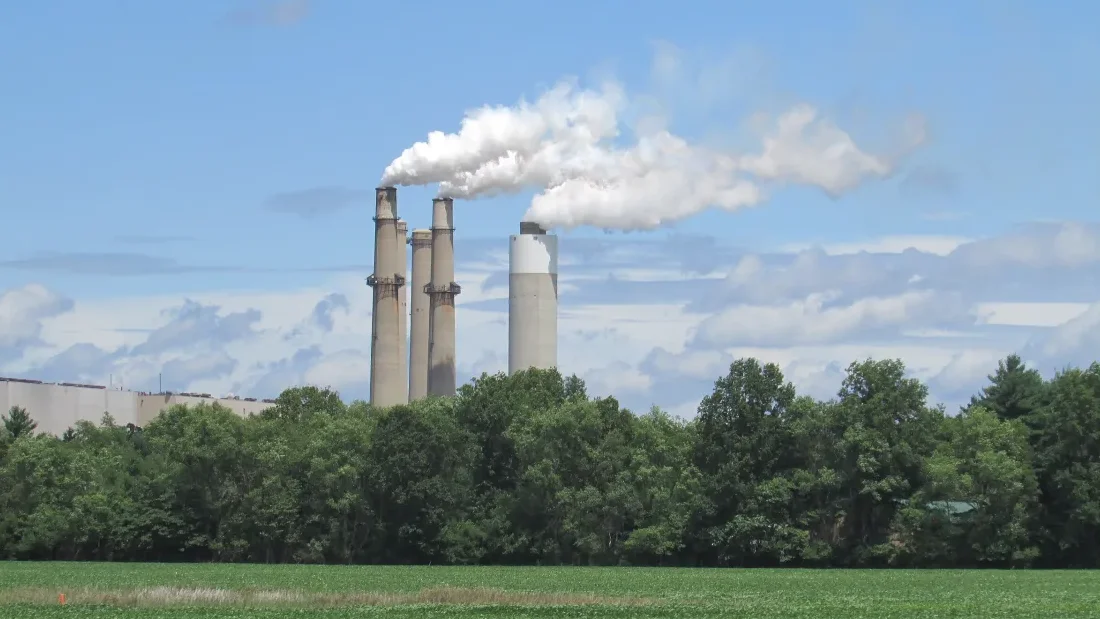
CLIMATE: New Hampshire’s new climate plan is unlikely to include emissions reduction targets, and will instead focus on voluntary measures, use of federal funds, and market-based solutions. (NHPR)
ALSO:
SOLAR: Commissioners in one Maryland county vote to tighten the requirements for solar installations on agricultural land as they face a flurry of interest from developers. (Baltimore Sun, subscription)
GEOTHERMAL: Communities in Massachusetts and Vermont are among those awarded federal funding to support the construction of geothermal heating and cooling networks. (Smart Cities Dive)
FOSSIL FUELS: A Pennsylvania oil and gas company will pay $2 million and reduce emissions at 49 facilities as part of a settlement of alleged Clean Air Act violations. (Allegheny Front)
BIOFUELS: In New York, biofuels suppliers tout their product as a lower-emissions option, though some worry their use would only slow progress toward electrification. (Times Union)
UTILITIES:
ELECTRIC VEHICLES: A New Jersey legislative committee votes for a two-year delay on the implementation of a rule that would require increasing sales of battery-powered vehicles. (NJ Spotlight News)
EFFICIENCY: Connecticut launches a pilot providing funding, training, and expertise to small manufacturing companies looking to implement energy efficiency measures or use renewable energy. (Hartford Business Journal)
COMMENTARY: The renewable energy industry in Maine has a positive effect on the economy and creates stable, good-paying jobs, and should not be blamed for rising energy costs, says the cofounder of a solar company. (Bangor Daily News, subscription)

CLEAN ENERGY: While the Project 2025 policy blueprint calls for eliminating the Energy Department’s Loan Programs Office, Republican lawmakers are uncertain, with some saying the program, which turned a profit last year, could be retooled to emphasize energy sources like nuclear that are favored by conservatives. (E&E News, New York Times archive)
ALSO:
EQUITY: Advocates say anticipated Trump administration climate rollbacks, particularly the expected elimination of the Justice40 initiative, will hit Black communities especially hard. (Capital B News)
EMISSIONS: The Regional Greenhouse Gas Initiative offers a model of successful state-led action on decarbonization, and is considering ways to expand participation as Trump pledges to roll back federal climate policies. (Energy News Network)
STORAGE: Duke Energy moves to demolish the final units of a former coal plant in North Carolina and replace it with a 167 MW battery storage facility, marking a step toward renewables even though the utility still plans to build gas-fired power elsewhere. (Canary Media)
WIND: A federal agency identifies environmental measures it will likely take in a group of six offshore wind lease areas off New York, pushing ahead despite Trump’s claims he will stop offshore wind development. (Maritime Executive)
NUCLEAR: A Tennessee city that’s historically been a hotspot for nuclear research is seeing a resurgence of interest from companies eager to take part in a new “nuclear renaissance.” (Knoxville News Sentinel)
PIPELINES: Whistleblowers warn the federal Pipeline and Hazardous Materials Safety Administration is “putting profit over safety” by largely relying on private inspectors hired by pipeline companies to monitor compliance with safety rules. (E&E News)
COAL: Wyoming and Montana join a lawsuit accusing three investment firms of following a “climate activist agenda” by colluding to acquire large stakes in publicly held coal companies and forcing the firms to slash Powder River Basin mine production. (Cowboy State Daily)
EFFICIENCY: A Minneapolis nonprofit is leading the construction of passive homes on the city’s north side that aim to save homeowners with minimal electric and heating bills. (Sahan Journal)
COMMENTARY: A Western journalist says the incoming Trump administration’s pro-drilling agenda will harm the environment while doing little to bolster oil and gas production — which reached record levels under Biden. (Land Desk)

COAL: Wyoming and Montana join a lawsuit accusing three investment firms of following a “climate activist agenda” by colluding to acquire large stakes in publicly held coal companies and forcing the firms to slash Powder River Basin mine production. (Cowboy State Daily)
OIL & GAS: Petroleum firms appeal a court order barring the federal Bureau of Land Management from issuing drilling permits for a Wyoming oil and gas project. (E&E News, subscription)
SOLAR:
BIOFUELS: Advocates push back on California Gov. Gavin Newsom’s proposal to expand ethanol-blending in gasoline, saying it is unlikely to lower fuel prices and could have environmental impacts in corn-growing regions. (Inside Climate News)
UTILITIES:
CLIMATE: Portland, Oregon, officials launch an online climate dashboard allowing residents to track local greenhouse gas emissions and local progress toward decarbonization targets. (OPB)
OVERSIGHT: California Gov. Gavin Newsom asks state lawmakers to allocate $25 million to fund litigation defending state climate, environmental and other progressive policies from the incoming Trump administration’s expected challenges. (Los Angeles Times)
MINING: A southeastern Utah copper mine lays off more than 55% of its workforce as it moves forward on a “significant restructuring effort.” (San Juan Record News)
PUBLIC LANDS: Wyoming advocates worry the incoming Republican-dominated Congress will overturn the Biden administration’s plan to tighten oil and gas drilling rules on 3.6 million acres of public land in the southwestern part of the state. (WyoFile)
COMMENTARY:

OFFSHORE WIND: A planned 114-turbine wind farm off Maryland receives final federal approval, but still faces local opposition and likely hostility from President-elect Donald Trump. (Maryland Matters)
RENEWABLES: New York state executes contracts for 23 renewable energy projects expected to reduce emissions by 2.3 million metric tons annually. (Renewable Energy Magazine)
BATTERIES: A company making zinc-based, long-duration batteries will use a $300 million federal loan guarantee to expand its Pennsylvania manufacturing facility to address a backlog of orders. (Utility Dive)
SOLAR:
ELECTRIC VEHICLES: The Canadian company that supplied electric school buses causing problems for several Maine school districts is on the brink of bankruptcy. (Portland Press Herald, subscription)
EMISSIONS: The company that owns the Three Mile Island nuclear plant in Pennsylvania, which is looking to restart to sell power to Microsoft, routinely ranks among the U.S. power producers generating the lowest carbon emissions. (The Well)
EFFICIENCY: An affordable housing project in New Haven, Connecticut, includes $900,000 to complete energy efficiency retrofits for 30 existing homes in the neighborhood of the new units. (Connecticut Public Radio)
ELECTRIFICATION: New York launches a $10 million program to help advance cold-climate heat pump technology by funding manufacturers developing the products and field demonstration projects in large buildings. (Facility Executive)
COMMENTARY:

BIOFUELS: A Colorado power plant fueled by shredded beetle-killed trees shuts down, putting wildfire mitigation efforts on hold and raising questions about the viability of biofuel-generated electricity. (Colorado Sun)
SOLAR:
GEOTHERMAL: A Nevada gold mine considers adding geothermal generation to an existing natural gas plant in an effort to decarbonize its operations. (news release)
EFFICIENCY: An Alaska-backed housing lender offers $10,000 rebates for new energy-efficient homes. (Alaska Public Media)
UTILITIES:
CLIMATE: Climate change-exacerbated extreme heat adds urgency to efforts to bring electricity to some 13,000 off-grid Navajo Nation homes. (KUNR)
ELECTRIC VEHICLES: California startup Aptera launches a crowdfunding campaign to bring its solar-powered electric vehicle to production. (Inside EVs)
BATTERIES: A California startup plans to begin manufacturing lithium-sulfur batteries at its Bay Area facility next year, saying they are cheaper and require less mined material than lithium-ion ones. (Heatmap)
TRANSITION: Los Angeles County votes to develop a plan aimed at helping displaced workers and communities weather Phillips 66’s petroleum refinery’s planned 2025 closure. (Daily Breeze)
TRANSPORTATION: Colorado officials expect a proposal to extend a passenger rail line to the northwestern part of the state will survive the incoming Trump administration’s funding cuts. (Aspen Times)
POLITICS: U.S. Rep. Raul Grijalva, of Arizona, steps down as the House Natural Resources Committee’s ranking Democrat, which oversees energy development and mining on federal lands. (Arizona Capitol Times)
COMMENTARY:

CLEAN ENERGY: New York added 7,700 clean energy jobs from 2022 to 2023 — a record increase — with especially significant jumps in the electric vehicle and clean transportation sectors. (WGRZ)
GRID: Renewable energy developers urge PJM to drop a plan to fast-track approval for select generating projects, saying the process would unfairly advantage fossil fuel and nuclear plants. (Utility Dive)
OFFSHORE WIND:
SOLAR: New Jersey regulators prepare to solicit 250 MW of community solar capacity in 2025, amid concerns that President-elect Trump could change crucial tax credits, complicating the economics of the projects. (RTO Insider, subscription)
CLIMATE: Vermont’s state environmental agency has identified $160 million in promised federal funding that could be clawed back by the incoming administration, including money supporting the transition off fossil fuels and helping low-income households go solar. (New Hampshire Public Radio)
BATTERIES: With more than a dozen battery storage projects planned on Staten Island, including one that would be New York City’s largest, locals worry about fire safety and proximity to homes and businesses. (SIlive.com)
TRANSMISSION: Stakeholders across New England widely support a plan to seek proposals to increase transmission capacity in New Hampshire and Maine, the first project to emerge from the region’s new long-term transmission planning process. (RTO Insider, subscription)
EFFICIENCY: A Massachusetts company aims to use modular construction to build affordable, net-zero homes that can also help address housing shortages. (Christian Science Monitor)
TRANSIT: Establishing an electrified commuter rail line from Boston to the western Massachusetts city of North Adams could attract hundreds of daily riders but would cost hundreds of millions of dollars, a state report concludes. (Greenfield Recorder)
INDUSTRY: A Massachusetts company completes negotiations for a $87 million federal award that will enable it to build a manufacturing plant that produces cement without using conventional fossil fuel-fired kilns. (news release)

CLEAN ENERGY: The Biden administration says it has handed out $100 billion in Inflation Reduction Act grants, and is on track to allocate more than 80% of available funds by the time President-elect Trump takes office. (Reuters)
ALSO:
UTILITIES:
GRID:
OFFSHORE WIND:
LITHIUM: California environmental justice advocates call on lithium extraction firms in the Imperial Valley to sign legally binding agreements to provide local jobs, protect health and the environment and respect tribal nations’ rights. (KPBS)
OIL & GAS: U.S. Supreme Court Justice Neil Gorsuch recuses himself from a case related to a proposed Utah oil-hauling rail line following criticism of his ties to Colorado petroleum magnate Philip Anschutz. (CNN)
CLIMATE: Experts say climate change contributed heavily to rising inflation in the last two years, as extreme weather shut down oil refineries and compromised food production. (Grist)

NATURAL GAS: Officials in a small Pennsylvania city announce plans to convert a shuttered coal-burning power plant to a natural gas-fired station and double its capacity, making it the largest gas-burning plant in the country. (Power)
ALSO: A Maine utility has completed a 14-year initiative replacing more than 125 miles of outdated and potentially unsafe gas pipes, some first installed as long as 110 years ago. (Portland Press Herald, subscription)
RENEWABLES: Mass Audubon celebrates the new state climate law’s emphasis on sustainable siting for renewable energy projects, but in western Massachusetts, some groups are concerned the new rules will allow the development of large-scale solar and battery projects against the will of local residents. (Greenfield Recorder)
NUCLEAR: Some experts are skeptical that restarting the Three Mile Island nuclear plant and pursuing other nuclear power projects will actually be a meaningful solution for the energy needs of artificial intelligence. (NPR)
TRANSMISSION: Construction is roughly halfway complete on a $6 billion transmission line intended to bring hydropower from Quebec down to New York City. (Times Union)
GRID:
COAL: Hundreds of abandoned coal mines that have hollowed out the ground in parts of western Pennsylvania raise renewed safety concerns after a four-day search for a woman who fell into a sinkhole last week. (TribLive)
ELECTRIC VEHICLES:
COMMENTARY: Maine’s struggles with malfunctioning and unsafe electric school buses from one company have sowed “disillusionment and doubt” that could harm the state’s ability to transition about from fossil fuel vehicles, says an editorial board. (Portland Press Herald, subscription)

WIND: A crypto mining company purchases a 114 MW wind farm in Texas and will remove it from a regional grid to power its operations. (Houston Chronicle)
ALSO: A company secures financing for a 189 MW onshore wind farm in North Carolina, the first wind project approved by the state since state lawmakers passed siting legislation in 2013. (news release)
OIL & GAS:
EFFICIENCY: Some school districts in Houston, Texas, have installed energy efficiency measures in recent years, but many others saw soaring electricity bills from computers and air-conditioning against late summer heat. (Houston Chronicle)
STORAGE:
GRID:
EMISSIONS: West Virginia presses a federal court to rule against the U.S. EPA’s proposed power plant emission rules, which target coal-fired and new gas-fired emissions. (WV News)
CLIMATE:
COMMENTARY:

Charlotte, North Carolina, may soon get access to a new tool to deploy in its push toward 100% clean power: data.
The Tar Heel state’s largest city aims to power all government operations with carbon-free electricity by the end of the decade, including the city-owned Charlotte-Douglas International Airport, one of the busiest in the world.
But the hub is a big question mark for the city’s climate target. Officials don’t actually know how much energy it uses — or how much renewable energy they need to offset it — because the utility bills for the five-terminal airport are paid by dozens of individual customers, from Cinnabon to Jamba Juice to airline club lounges.
Now, after a decade of urging by Charlotte and others, Duke Energy has a proposal to change that: an eight-page plan for improved data access that has sign-off from the North Carolina Sustainable Energy Association; Public Staff, the state-sanctioned customer advocate; and Dominion Energy, which serves the northeast corner of the state.
Filed last month with regulators for approval, Duke’s proposed rules could have wide application, said Ethan Blumenthal, regulatory counsel for the North Carolina Sustainable Energy Association.
“For municipalities applying for federal grants, large customers pursuing energy efficiency, and homeowners and solar companies that are trying to right-size solar installations,” Blumenthal said, “this access to data is essential.”
The Charlotte airport is a prime example of one hurdle facing local communities with climate goals. Today, getting total energy usage data for government-owned buildings with multiple meters means reaching out to individual tenants to get permission to access their accounts.
“It would be a very laborious process to do that at the airport and anywhere else we have tenants,” said Aaron Tauber, Charlotte’s sustainability analyst.
The problem extends to private building owners who aim to reduce their carbon footprints or improve efficiency but don’t have insight into their renters’ energy consumption. Honeywell, for instance, is a partner in the city’s “Power Down the Crown” initiative, whereby building managers look to reduce energy use by optimizing efficiency.
“They don’t own all of the data,” Tauber said. “They have tenants in their properties. So, they don’t have visibility to the entire building’s energy use.”
The new rule will allow a large user, from Honeywell to Charlotte, to access aggregated data for a large building with multiple tenants by request to Duke, so long as at least 15 individual accounts are involved, and none consumes more than 15% of the building’s energy use.
“Being a larger city, we do have a lot of large buildings with multiple tenants,” said Tauber. “I’m just really excited for these building owners to really — for the first time — gain an understanding of how their buildings are using energy.”
That understanding, he said, is critical for commercial properties to access a new law that allows them to borrow public money for energy efficiency upgrades and pay it back on their property tax bills.
“Being able to unlock a financing mechanism based on this data will really go a long way for the city to be able to meet our strategic energy action goal of being a low-carbon community,” said Tauber.
The data access rule also applies to a census block, zip code, or other area with at least 15 accounts, which will help local governments meet community-wide climate goals.
“You can use the aggregated data to make good decisions for program design, and where you might want to target,” said Ann Livingston, senior executive and director of programs with the Southeast Sustainability Directors Network. “You can assess: is this particular block or neighborhood really using a lot more energy per house per square foot than others?”
Durham County, for instance, together with neighboring Granville and Orange counties, has a $1.5 million federal grant to help low-income homeowners cut their energy use through weatherization and other upgrades.
“We want to focus in areas where there’s a higher energy use or higher energy burden,” said Tobin Freid, the county’s sustainability manager. “We’d like information at a more granular level than just the county.”
If the new Duke rule is approved, it will also help county officials better tailor the program to individual households and assess its impacts. The proposal would ease the approval process for allowing third-party access to data and ensure that at least two years of prior energy use is included.
“For every home that we work on, we would need historic data to see: what was your energy use before?” Freid said.
Both the aggregated data and third-party access provisions will also be critical for federal programs like Solar for All, aimed at deploying rooftop solar on low-income households.
“Often, those federal funding opportunities require you to assess and report on energy impact,” said Livingston. “Solar for All will be a very clear example of this, where you need to report energy savings for individual participants.”
Apart from the sustainability goals, government officials also have a commitment to manage public dollars efficiently, Livingston noted. That’s especially pertinent for large energy users like Durham County, who may pay a higher “demand charge” for a single 30-minute spike in energy use. Large customers with net-metered solar power also pay more during times of peak demand.
The proposed rules will help solve these challenges by allowing third parties access to machine-readable, easily analyzed data for customers of all sizes. The format would essentially meet national “Green Button” standards, one familiar to the many companies around the country dedicated to managing building energy performance.
The Green Button initiative, a project of the U.S. Department of Energy that originated in Canada, has been around for over a decade – about as long as the Sustainable Energy Association has been advocating for improved customer data access, along with counties like Durham.
But the issue seems to have gained new steam in recent months, as local governments look to take advantage of new federal grants and laws aimed at reducing climate pollution.
What’s more, Blumenthal said, Duke has pledged to implement the rules within 18 months of their approval and help expedite any data requests in the interim.
“There is a commitment to doing everything they can, essentially, to provide data for federal funding purposes up until [the proposal] is fully implemented,” Blumenthal said. “A commitment to try to bridge the gap.”
Asked what prompted the agreement with Blumenthal’s group and others after all this time, Duke spokesperson Logan Stewart said over email:
“A lot has changed in the last decade from a technology, cybersecurity, and customer engagement perspective that made this stipulation possible. Duke Energy is always looking for ways to collaborate with stakeholders to achieve outcomes that benefit customers.”